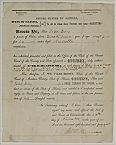| Entries |
| U |
|
Underground Railroad
|

|
Prior to the Fugitive Slave Act of 1850, enslaved African Americans who began their perilous journeys in Missouri, Kentucky, and Tennessee found Chicago to be a relatively safe destination. Although the Illinois Black Codes denied them full citizenship rights, they opened businesses or hired out their services performing tasks for which they had been uncompensated while in bondage.
After passage of the Fugitive Slave Act slavecatchers abducted black people even if they had certificates of freedom. Black and white abolitionists converged on the Chicago Common Council to protest Senator Stephen A. Douglas' support of this bill. Subsequently many black Chicagoans emigrated to Canada where they could be protected under British law.
The Encyclopedia of Chicago © 2004 The Newberry Library. All Rights Reserved. Portions are copyrighted by other institutions and individuals. Additional information on copyright and permissions.